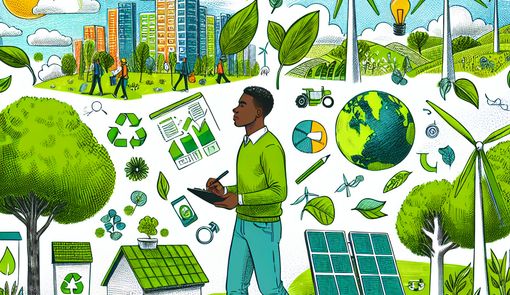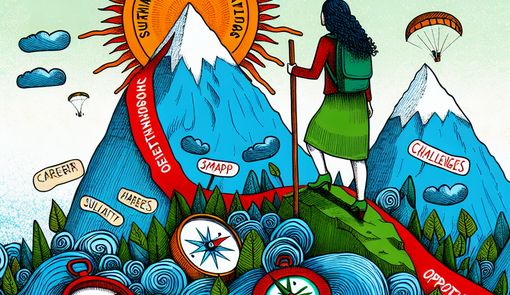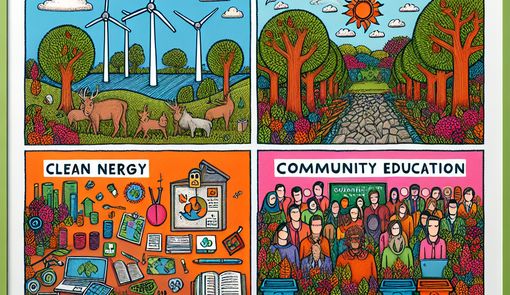A Day in the Life of a Sustainability Coordinator: What to Expect

In today’s ever-evolving employment landscape, the role of Sustainability Coordinator has become increasingly prominent. Organizations, now more than ever, are realizing the importance of incorporating sustainable practices into their operations to not only enhance their reputation but to also contribute to the global effort of preserving our environment. Let’s dive into the daily life of a Sustainability Coordinator and what one can expect when undertaking this crucial role.
A Sustainability Coordinator, also known as a Sustainability Specialist or Environmental Coordinator, is responsible for overseeing and promoting environmental initiatives within an organization. From developing and implementing strategies to reduce waste and conserve resources, to engaging with both internal and external stakeholders, the duties of a Sustainability Coordinator are as diverse as they are significant.
A Typical Day for a Sustainability Coordinator
Early Morning (8:00 AM – 9:00 AM)
- Reviewing Daily Goals: The day starts with sifting through emails and messages, setting priorities, and establishing goals for the day.
- Team Briefing: A quick meeting with the team may take place to align on tasks and discuss any immediate actions that need to be taken pertaining to sustainability projects or initiatives.
Mid Morning (9:00 AM – 11:00 AM)
- Data Analysis and Reporting: A significant part of the morning is spent analyzing data related to the organization's sustainability metrics. This could involve reviewing energy consumption reports, waste management statistics, or any other relevant data that guides decision-making.
- Sustainability Audits: Conducting or planning for audits of current practices can also occur during this time to identify areas for improvement.
Lunch Break (12:00 PM – 1:00 PM)
A Sustainability Coordinator understands the value of breaks to reset and refresh for a productive afternoon, often choosing to enjoy a sustainably sourced meal.
Early Afternoon (1:00 PM – 3:00 PM)
- Meetings and Collaboration: Participating in or leading cross-departmental meetings is a common occurrence. These sessions are geared towards integrating sustainable practices across various aspects of the organization.
- Engagement Activities: Outreach programs and campaigns to promote environmental consciousness and sustainability initiatives among employees are often organized and executed during this time.
Late Afternoon (3:00 PM – 5:00 PM)
- Project Management: The latter part of the day may involve managing ongoing sustainability projects, ensuring that they stay on track, monitoring progress, and addressing any issues that may arise.
- Research and Development: Keeping updated with the latest sustainability trends, technologies, and regulatory changes is crucial for the advancement of the organization’s sustainability agenda.
Evening (5:00 PM Onward)
Before clocking out, a final review of the day’s progress is conducted, along with preparations for the following day. Networking events and seminars might occasionally extend the workday in the pursuit of new partnerships and learning opportunities.
Challenges Faced by Sustainability Coordinators
Sustainability Coordinators often face several challenges throughout their day:
- Resistance to Change: Convincing departments or individuals to change their established routines to incorporate sustainable practices can be a tough sell.
- Budget Constraints: Working within the confines of a budget can limit the scope of sustainability initiatives.
- Keeping Abreast of Regulations: Staying updated with sustainability regulations requires constant vigilance, which can be taxing.
- Measuring Impact: Quantifying the impact of sustainability measures is often a complex task and essential for securing buy-in for future projects.
Skills Required for Success
- Analytical Skills: To effectively analyze sustainability metrics and identify trends.
- Project Management: To oversee sustainability projects from conception to completion.
- Communication: To engage effectively with stakeholders and promote sustainability initiatives.
- Adaptability: To rapidly respond to changing regulations and environmental needs.
Final Thoughts
A day in the life of a Sustainability Coordinator is multifaceted and challenging, yet inspiring and endlessly rewarding. It’s a role that requires dedication, passion, and a commitment to environmental stewardship. For those who choose this path, the impact on both their organization and the planet can be profound. As we continue to grapple with environmental issues, the role of the Sustainability Coordinator will undoubtedly become more integral in shaping a sustainable future for all.
Frequently Asked Questions (FAQs)
What qualifications are needed to become a Sustainability Coordinator?
To become a Sustainability Coordinator, a bachelor’s degree in environmental science, sustainability, engineering, or a related field is typically required. Some positions may also prefer candidates with master’s degrees or specialized certifications in sustainability.
What career path can one follow after working as a Sustainability Coordinator?
After gaining experience as a Sustainability Coordinator, individuals can progress to roles such as Sustainability Manager, Environmental Health and Safety Specialist, Corporate Social Responsibility Manager, or even Chief Sustainability Officer. The career path often involves increasing levels of responsibility and leadership in sustainability initiatives.
How can organizations benefit from having a Sustainability Coordinator?
Organizations stand to benefit in various ways from having a Sustainability Coordinator on board. These benefits include cost savings through efficient resource management, improved brand reputation and stakeholder relations, compliance with environmental regulations, and the ability to attract environmentally conscious employees and customers.
How does a Sustainability Coordinator collaborate with different departments within an organization?
Sustainability Coordinators collaborate with various departments by integrating sustainable practices into their processes. This can involve working closely with facilities management to improve energy efficiency, partnering with HR for employee training on sustainability practices, and coordinating with procurement to source environmentally friendly products.
What are some common sustainability initiatives that Sustainability Coordinators implement?
Sustainability Coordinators commonly implement initiatives such as waste reduction and recycling programs, energy efficiency improvements, water conservation measures, promoting sustainable transportation options, and green procurement practices.
How can individuals interested in sustainability careers start their journey?
Individuals interested in sustainability careers can start by pursuing relevant education, gaining experience through internships or entry-level positions in sustainability-related roles, volunteering for environmental organizations, and networking with professionals in the field. Continuous learning and staying informed about sustainability trends are also essential for career growth in this field.
Further Resources
For readers interested in delving deeper into the role of Sustainability Coordinators and exploring sustainable practices in the workplace, the following resources provide valuable insights and information:
- GreenBiz: GreenBiz is a leading source for sustainable business news, providing articles, webinars, and reports on environmental initiatives.
- Sustainability 101 from Environmental Protection Agency: The U.S. Environmental Protection Agency offers a comprehensive guide to sustainability basics, including tools and resources for organizations.
- World Business Council for Sustainable Development (WBCSD): WBCSD is a global organization that works with companies to promote sustainable business practices and environmental stewardship.
- GRI Standards: The Global Reporting Initiative provides standards and guidelines for sustainability reporting, aiding organizations in measuring and communicating their environmental impacts.
- Sustainability Career Guide from Green Careers Guide: This resource offers insights into building a career in sustainability, including job roles like Sustainability Coordinator and tips for aspiring professionals.
- Sustainability Tools and Resources from Sustainable Pittsburgh: Sustainable Pittsburgh offers a variety of tools, guides, and resources for individuals and organizations looking to adopt sustainable practices.
- Corporate Sustainability Reporting from Ceres: Ceres provides resources and reports on corporate sustainability reporting, helping companies integrate environmental and social responsibility into their strategies.
- United Nations Sustainable Development Goals: Explore the UN's Sustainable Development Goals to understand the global targets for sustainability and how organizations can contribute to a more sustainable world.
By exploring these resources, Sustainability Coordinators and individuals interested in sustainable practices can enhance their knowledge, stay updated on industry trends, and drive impactful change within their organizations and communities.






